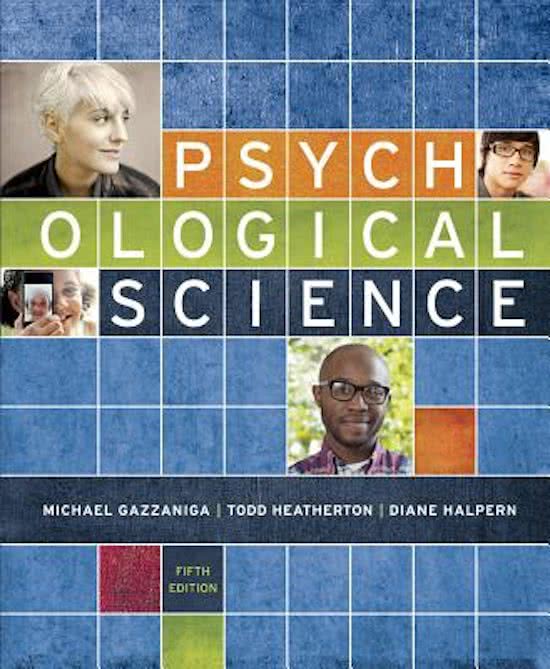University of Groningen 2025
Methodology (ch2)
methodology= how evidence is gathered and verified in psychology
empiricism= psychologist gain accurate knowledge about behavior and mental
processes only by observing the world and measuring aspects of it.
3 primary goals of science;
1. description
2. prediction
3. explanation
uses research to describe what a phenomenon is, predict when and where it will
occur and explain the mechanisms behind why it occurs.
research= a scientific process that involves the careful collection, analysis and
interpretation of data
data = measurements gathered during the research process
scientific method= a systematic and dynamic procedure of observing and measuring
phenomena, used to achieve the goals of description, prediction, control &
explanation. It involves an interaction among research, theories and hypotheses.
theory= a model of interconnected ideas or concepts that explains what is observed
and makes predictions about future events. They are based on empirical evidence.
↪ good theory should be falsifiable
hypothesis= a specific, testable prediction, narrower
than the theory is based on.
Occan’s razor / law of parsimony= when 2 competing
theories exist to explain the same phenomenon, the
simpler is generally preferred.
Q/ Which scientific goal is fulfilled by a project seeking to
understand the causes of teen vaping
A/ Explanation
,qualify→ describe
quantify→ measure
variable= something in the world that can vary and that a researcher can manipulate
(change), measure (evaluate), or both.
operational definition= a definition that qualifies and quantifies a variable so the
variable can be understood objectively
peer review= a process by which other scientists with similar expertise evaluate and
critique research reports
scientific poster= presents info about the hypotheses, methods, results &
conclusions of a research study.
replication= repeating of a research study to confirm or contradict the results.
false positive= a result that occurs when there is no real effect but a study produces
a statistically significant result by chance.
questionable research practices= practices that unintentionally make the research
less replicable
↪ effects of questionable research practices;
- small samples ( a larger sample is required to achieve an accurate estimation
of the population effects)
- HARKing= hypothesizing after the results are known instead of generating a
theory before running the study and analyzing the results.
- p-hacking= testing the same hypothesis using statistical tests in different
variations until one produces a statistically significant result
- underreporting null effects ( a null effect= finding no difference between
conditions or no relationship between variables)
to protect against questionable research practices:
- preregistration= documenting a study’s hypotheses, methods and analysis
plan ahead of time and publishing it on a time-stamped website
- meta-analysis= a study of studies that combines the findings of multiple
studies to arrive at a conclusion
Q/ how does pre registration prevent HARKing?
A/ It forces researchers to publicly document their hypothesis before conducting a
study.
fake news= stories without supporting evidence that are made up for personal
reasons, advertising or political purposes
, well-supported evidence in science→ research reports based on empirical data that
are published in peer-reviewed journals or preprint servers.
Types of studies used in psychological research:
1. descriptive research= research methods that involve observing behavior to
describe that behavior objectively and systematically
- case study= a descriptive research method that involves the intensive
examination of an atypical person or organization
- observational studies→ participant observation & naturalistic
observation
↪ participant observation= the researcher is involved in the situation,
naturalistic observation= researcher is a passive observer, separated from the
situation and making no attempt to change or alter ongoing behavior.
- self-report methods= methods of data collection in which people are
asked to provide information about themselves, such as in surveys or
questionnaires
2. Correlation studies= a research method that describes and predicts how
variables are naturally related in the real world, without any attempt by the
researcher to alter them or assign causation
between them.
- scatterplot= a graphical depiction of the
relationship between 2 variables
- correlation coefficient= a descriptive
statistic that indicates the strength and
direction of the relationship between 2
variables
↪ directionality problems= a problem encountered in correlation studies. The
researcher finds a relationship between 2 variables, but they cannot determine which
variable may have caused changes in the other variable (does A lead to B orr does B
lead to A)
↪ third variable problem= a problem that occurs when the researcher cannot
directly manipulate variables, as a result the researcher cannot be confident that
another unmeasured variable is not the actual cause of differences in the variables
of interest.
3. experimental research → the researcher has maximal control over the
situation
- experiment= a research method that test causal hypotheses by
manipulating and measuring variables
- independent variable= the variable that is manipulated in a research
study


